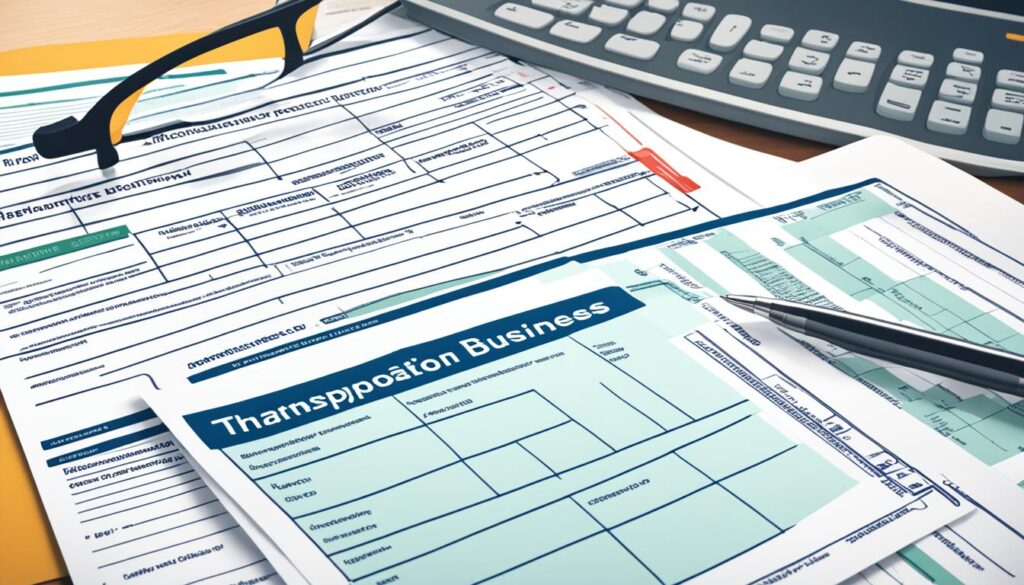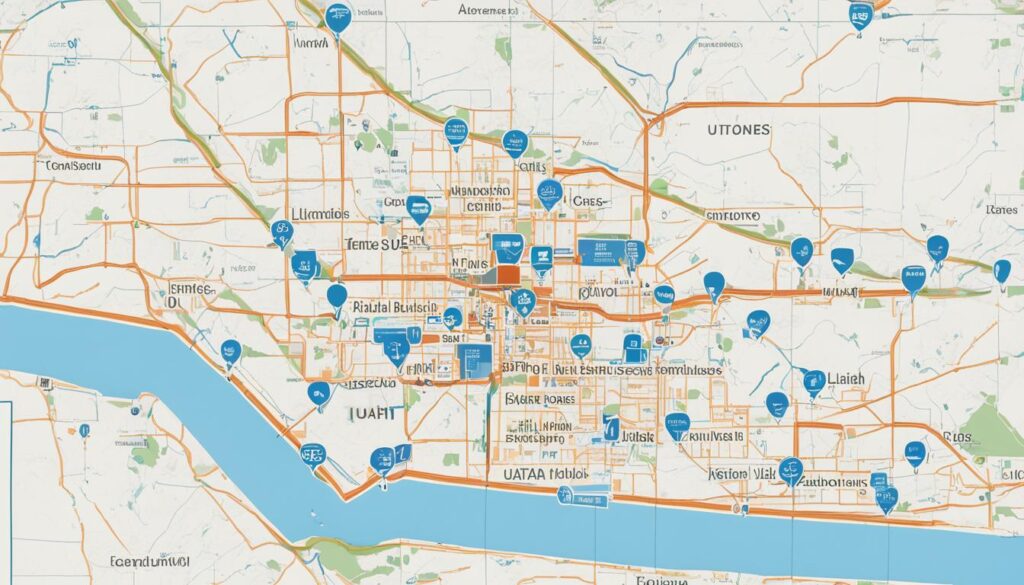Are you thinking of starting a transportation business? You’ll need a license to legally operate. This license is key for companies that move people or goods. Each state has its own rules for getting this license.
Whether you’re planning a taxi service, shuttle, or courier company, you must get the right license. Before you apply, make sure you have a valid state driver’s license and enough liability insurance. Most states let you apply for a transportation business license online through their transportation agency.
Remember, following the rules is crucial. Officials check if all drivers have valid licenses and if your business meets vehicle registration standards. Keeping up with commercial driver’s license requirements helps your business run smoothly.
Key Takeaways
- A transportation business license is essential for legal operation
- Requirements vary by state and type of transportation service
- Valid driver’s license and liability insurance are prerequisites
- Online application through state transportation agencies is common
- Regular compliance checks are conducted by officials
- Proper vehicle registration is necessary
- Commercial driver’s license requirements must be met
Understanding Transportation Business Licenses
Transportation business licenses are key for companies in the transport sector. They make sure your business follows industry rules and stays legal.
Types of Transportation Businesses Requiring Licenses
Many transport services need special permits. These include:
- Taxi companies
- Car rental agencies
- Trucking firms
- Moving services
- Medical transport providers
Each type might need different permit applications. This depends on their specific work and how they charge.
Benefits of Obtaining a Proper License
Having the right license brings many benefits:
- Builds trust with customers
- Shows you follow the rules
- Keeps your business safe from legal problems
- Lets you get certain contracts or routes
Getting the right license also makes sure you have the right insurance. This protects your business and customers.
Consequences of Operating Without a License
Running a transport business without a license can cause big problems:
- Hefty fines
- Legal troubles
- Damage to reputation
- Potential business closure
To avoid these issues, it’s key to get the right licenses for your transport business. This meets all legal needs and helps you run smoothly in the competitive transport market.
Preparing for Your Transportation Business License Application
Getting ready for your transportation business license means following a few important steps. First, you need to look into your state’s rules. Then, gather all the necessary documents and ensure you have the right insurance.
State-Specific Requirements
Every state has its own rules for transportation businesses. Make sure to check with your state’s Business Licenses department for what you need. You might need to show business entity formation papers and industry certifications.
Gathering Documentation
Here are the key items you should collect:
- Valid driver’s license
- Proof of insurance
- Business formation documents
- Vehicle registration papers

Insurance Compliance
Insurance needs change based on your state and the type of service you offer. For instance, California requires $300,000 to $5,000,000 in liability coverage. Make sure to check your state’s rules and get the correct insurance.
Don’t forget to get an Employer Identification Number from the IRS. This is crucial for taxes and setting up your business credit. By doing these things, you’ll be ready for your license application.
How to Get a Transportation Business License

Getting a transportation business license takes several steps. You need to plan carefully and follow the rules. First, pick your business type and a unique name. Then, register your business with your state’s Secretary of State.
After registering, get an Employer Identification Number (EIN) from the IRS. This is important for taxes and legal stuff. Look into the licenses and permits you need for your type of transport. These might include:
- Commercial driver’s licenses
- Vehicle registrations
- Special permits for hazardous materials
Make a detailed business plan. It should cover your operations, market analysis, and money plans. This plan will help you grow your business and might help you get funding. Make sure you have the right gear and vehicles for your transport services.
Remember, following the rules is crucial. Keep up with local, state, and federal laws that affect your business. Meeting all legal requirements from the start will help your business do well and avoid problems.
Navigating the Application Process
Getting your transportation business license involves a few key steps. The process might seem daunting, but with the right approach, you can smoothly navigate through it.
Completing the application form
Start by visiting your state’s transportation agency website. Look for the online permit applications section. Fill out the form with care, making sure every detail is correct. This step is crucial for regulatory compliance and getting your operational permits.
Submitting required documents
Gather all necessary paperwork before you begin. You’ll need proof of insurance, vehicle registrations, and business formation documents. Some states may ask for additional items, so double-check the requirements. Having these ready will speed up your application process.
Paying application fees
Be prepared to pay the required fees when submitting your application. The cost can vary depending on the type of transportation permit you need. After payment, you might need to undergo background checks or vehicle inspections. Stay in touch with the licensing office to address any questions quickly and keep your application moving forward.
FAQ
What types of transportation businesses require a license?
What are the benefits of obtaining a proper transportation business license?
What are the consequences of operating a transportation business without a license?
What should I research before applying for a transportation business license?
What documentation is typically required for a transportation business license application?
How do I ensure compliance with insurance requirements for a transportation business?
What are the steps involved in the transportation business license application process?
Author
-

David Nguyen is an expert in business licensing, with extensive knowledge in local and international regulations. His expertise is crucial for businesses seeking guidance on compliance and licensing strategies.
View all posts



